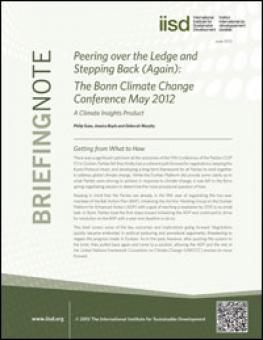
Peering over the Ledge and Stepping Back (Again): The Bonn Climate Change Conference May 2012
While the COP 17 outcomes did provide some clarity as to what Parties were striving to develop in response to climate change.
It was (as it always is) left to the Bonn spring negotiating session to determine the more procedural how.Keeping in mind that the Parties are already in the fifth year of negotiating the two-year mandate of the Bali Action Plan (BAP), initializing the Ad Hoc Working Group on the Durban Platform for Enhanced Action (ADP) with a goal of reaching a resolution by 2015 is no small task. In Bonn, Parties took the first steps toward initializing the ADP and continued to strive for resolution on the BAP with a year-end deadline to do so.This brief covers some of the key outcomes and implications going forward. As frequently seems to be the case, negotiators became embroiled in political posturing and procedural arguments, threatening to negate the progress made in Durban. As in the past, however, after pushing the system to the brink, they pulled back and came to a solution, allowing the ADP and the rest of the UNFCCC process to move forward.
You might also be interested in
December 2024 | Carbon Minefields Oil and Gas Exploration Monitor
In November 2024, 23 oil and gas exploration licences were awarded across five countries, with Russia granting the licences that account for the largest portion of embodied emissions.
Increased Support Needed to Achieve India's Clean Energy Goals
India is on track to achieve many of its 2030 clean energy goals but needs to step up government support measures to accelerate the deployment of offshore wind, electric vehicles, and green hydrogen, according to a new report.
Budgeting for Net Zero
This study estimates the cost gap for battery energy storage systems (BESSs), offshore wind, solar photovoltaic (PV), electric vehicles (EVs), and green hydrogen (GH2) to inform government support.
Artisanal and Small-Scale Mining of Critical Minerals
This report examines the potential for artisanal and small-scale mining (ASM) to take an expanded role in the global supply of critical minerals.